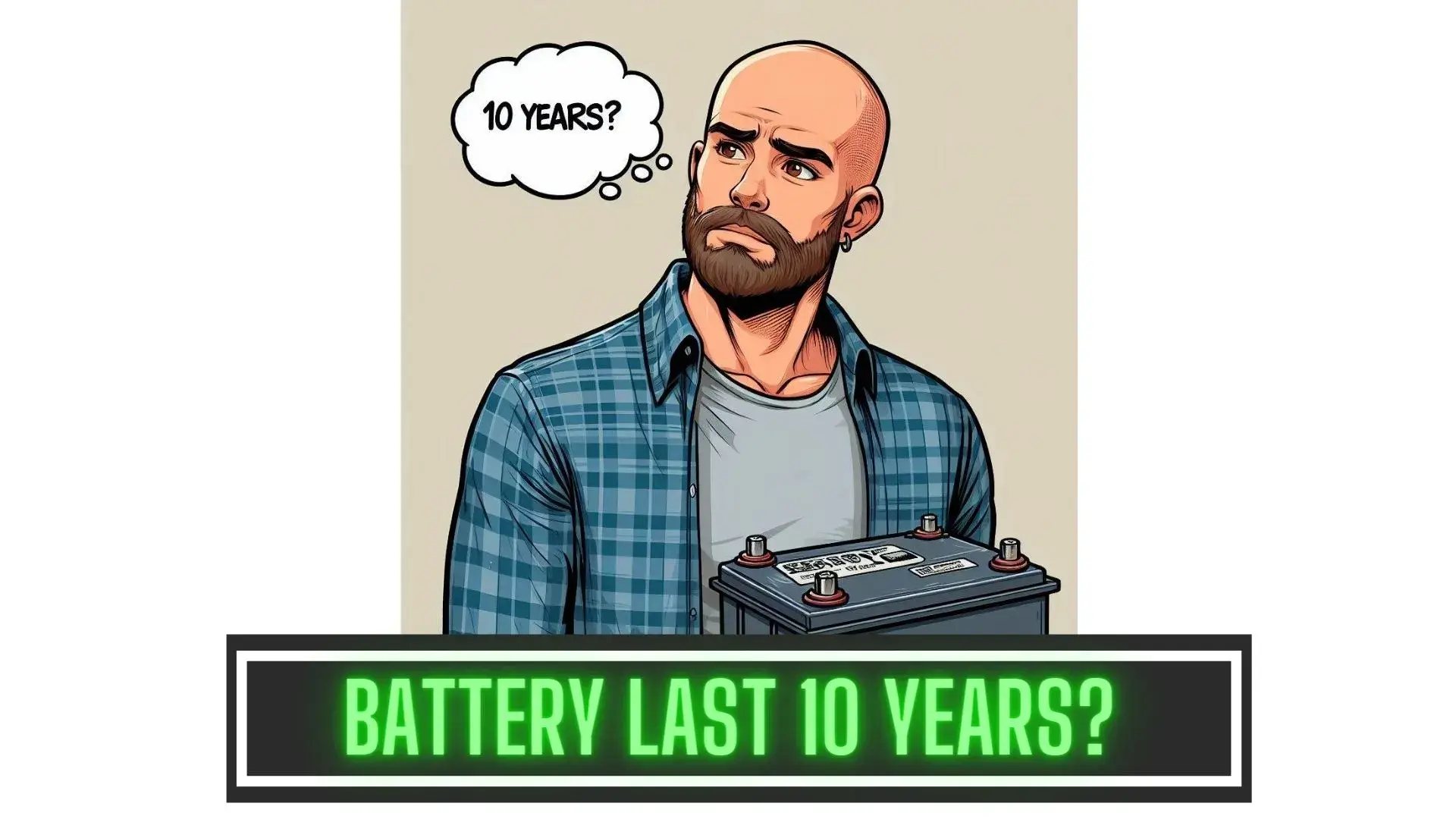Can a Car Battery Last 10 Years? Explore the potential of today’s batteries and learn how to maximize their lifespan in your vehicle.
What’s the one thing that can ruin your day faster than anything else? A dead car battery. It’s happened to me more times than I can count, and it’s always a nightmare. But what if I told you that there’s a way to avoid this problem forever?
What if I told you that car batteries could last 10 years, but that’s highly unusual for most vehicles? How is that possible? And what are the secrets to making your car battery last longer?
Well, I’m glad you asked, because I have the answers for you. Can a Car Battery Last 10 Years? The answer is it depends. If you have an Electric Vehicle, it is more than possible. A traditional lead acid battery in a petrol or diesel vehicle – not so much.
In this post, I’ll explain how car batteries work and reveal how to make yours last longer. This is important information, so keep reading!
| Battery Type | Average Lifespan | Additional Details |
|---|---|---|
| Standard lead-acid | 3-5 years | Used in most regular cars, prone to sulfation and corrosion |
| AGM lead-acid | 4-6 years | More resistant to vibration damage, less prone to leaking than standard lead-acid |
| Gel lead-acid | 5-8 years | Can withstand deeper discharges, most expensive lead-acid battery |
| Lithium-ion (EV) | 10-20 years | High energy density, no risk of acid leaks or corrosion |
Table of Contents
Key Takeaways
- Car batteries can last ten years, but that’s highly unusual for most vehicles.
- Battery type, climate, and maintenance all impact a car battery’s lifespan.
- The average car battery lasts between three and five years with proper care.
Can a Car Battery Last 10 Years? Types of Car Battery and Their Expected Lifespan
There’s no getting away from it. All car batteries are different, and their lifespan can vary greatly.
In this section, let’s jump into the common types of car batteries and how long they usually last.
Flooded Lead Acid Battery
Flooded lead acid batteries are the most traditional type of car batteries. They require regular maintenance. Topping up the electrolyte on a regular basis avoids many charging issues. Flooded lead-acid and sealed lead-acid batteries often last between 3 to 5 years. Weather affects their lifespan, too. Heat shortens their life, while cold weather can reduce their capacity.
FLA BATTERY LIFESPAN: 3-5 YEARS
AGM Battery
Absorbent Glass Mat (AGM) batteries are more advanced than flooded lead acid batteries. They’re maintenance-free and more resistant to short circuits. With proper care, AGM batteries usually have a lifespan of around seven years. Just like flooded lead acid batteries, the surrounding temperature can affect their lifespan. In warm weather, they can degrade more quickly.
AGM BATTERY LIFESPAN: 3-6 YEARS
Electric Vehicle Batteries
Electric vehicles (EVs) use different types of batteries. Most EVs use lithium-ion batteries with longer lifespans than the previous two types. Most manufacturers provide a five- to eight-year warranty for EV batteries, though the best ones can last 10 to 20 years.
Usage patterns and regular charging also affect battery lifespan. Charging EV batteries to full capacity isn’t always necessary. Keeping them between 20% and 80% is better to reduce battery degradation.
When it’s time to replace an electric vehicle battery, remember that many of its parts can be recycled. Recycling reduces the impact on the environment.
EV LI-ION BATTERY LIFESPAN: 8-20 YEARS
Factors Affecting Car Battery Lifespan
Remember I previously mentioned that external factors affect battery lifespan? Well, they really do, no exaggeration.
This section will explain what factors can shorten your battery life.
Usage Pattern
A big thing to consider is your car’s usage pattern. The more often you start my car, the more strain you put on the battery. Constant short trips may prevent the battery from fully recharging. It’s important to make sure your car battery gets to charge completely, so it is a good idea to go for a longer trip now and again to give your battery a good charge.
Maintenance
Another key factor is proper maintenance. Regularly inspecting your battery can help prevent issues and extend its life. I follow these simple steps:
- Keep the battery clean, as dirt and debris can lead to corrosion and shorten battery life.
- Check for loose cables and tighten them to ensure strong connections.
- Look for any bulging, cracks, or leaks which can indicate damage.
Weather Conditions
Weather also plays a big part. Warm weather accelerates battery degradation. In hot climates, your battery may last only about three years, while in colder areas, it could last up to 5 years or more. Here are some steps you can take to mitigate the effects of weather on your battery:
- Park in a shaded area or garage to protect the battery from high surrounding temperatures.
- During winter, use a battery maintainer when the car is not in use to keep it charged and ready to go.
Electric Car Batteries
Since we have already discussed lead acids, let’s have a closer look at EV batteries.
Electric car batteries last longer than traditional car batteries. Electric car manufacturers offer warranties for their batteries. For example, the Tesla Model S has a warranty of eight years or 125,000 miles, whichever comes first.
But even modern lithium-ion (li-ion) electric car batteries suffer degradation over time. This means the battery’s ability to hold a charge slowly decreases. But, this process is slow and gradual in most cases.
To maintain an electric car battery’s performance, do this:
- Store the car in temperature-controlled environments.
- Don’t charge the battery continuously to 100%.
- Use the manufacturer’s recommended charging equipment.
As we saw earlier, battery life depends on factors such as driving conditions, vehicle type, and maintenance. This is true for electric car batteries as well. While they have longer lifespans and are backed by warranties, proper care makes a big difference.
Proper Maintenance and Care for Longevity
Taking good care of your car battery can extend its life, and may even help it run for 10 years. In this section, I will go through various strategies to maintain your car battery. I will also cover how to secure its longevity.
Regular Checkups and Service
I recommend having your car battery checked regularly at a professional service center. Ideally, aim for every six months. Seasonal changes can cause significant wear and tear on your battery. Regular checks can catch any early warning signs of potential problems.
During these checkups, the technician will examine your battery for signs of:
- Corrosion
- Vibration damage
- Loose battery terminals
- Weak or damaged alternators
The technician can address these issues early, which helps protect your battery’s health.
Keeping the Battery Charged
Keeping a car battery charged is one of the most important aspects of maintaining it. An undercharged battery can lead to decreased performance and a shorter lifespan.
Here are some tips for keeping your battery charged:
- Drive regularly: Your car’s alternator charges the battery as you drive. Aim to drive for at least 15 minutes at a time to give the alternator enough time to charge the battery fully.
- Avoid short trips: Quick rides can prevent the battery from charging properly. Combine short errands into one longer trip to maintain the battery’s power.
- Stay on top of electrical problems: Electrical issues can drain your battery quickly. If you notice any unusual behavior from your electronics, have it checked out
- Use a trickle charger: If you don’t use your car often or leave it parked for long periods, consider using a trickle charger. It will help maintain the battery’s charge.
A well-charged and maintained battery can last much longer than the average car battery. These steps can help you extend your car battery life to the maximum possible. Just keep in mind that every battery has a natural range, and eventually, it will need to be replaced.
Battery Replacement and Options
I have some great options when it’s time to replace my car battery. In this section, I’ll talk about two of my favorites. They are the Optima YellowTop Battery and the Costco Battery. They are at each end of the price spectrum, and how much I spend depends on how much I’ve got.
Optima YellowTop Battery
When I can, I choose the Optima YellowTop Battery for my car. It’s known for its high performance and long-lasting power. Not all batteries are created equal; I can avoid battery degradation for some time with this battery.
The Yellowtop is designed for vehicles with high electrical demands. This dual-purpose battery boasts strong starting power and deep cycling capabilities. It’s perfect for cars with lots of accessories, like powerful audio systems, extra headlights, or fast chargers. This option is appealing since I want my battery to last as long as possible.
Costco Battery
Another option, if I’m not blessed with excess cashola, is to go to Costco. Costco offers surprisingly reliable and affordable car batteries.
Costco stocks batteries suitable for a range of vehicles, so you have a good chance of finding a suitable fit for your vehicle.
Remember, regardless of my choice, regular battery maintenance will ensure better performance. By keeping the battery clean and secured, I can avoid unnecessary problems. So, whether it’s the high-performance Optima YellowTop or an affordable Costco battery, there are great options out there.
Before You Go…
Maximize Your Investment: You’ve learned how a car battery can last 10 years, but what happens when your car sits unused for a long period?
Just like you, your car battery needs regular exercise to stay in shape. Don’t let your investment go to waste. Learn how to keep your battery healthy during periods of inactivity in our article, “How Long Can a Car Battery Sit Unused? How to Avoid a Dead Battery and Save Money”.
Frequently Asked Questions
Here’s the FAQs
How long does an average car battery typically last?
A new car battery usually lasts between 2 to 5 years. But, well-maintained ones can last more than six years.
What factors affect car battery lifespan?
Several factors can affect the lifespan of a car battery, including:
- Weather: Extreme temperatures, especially the heat, hurt batteries
- Driving habits: Shorter trips hurt battery life
- Maintenance: Poor maintenance reduces the life of a battery
Does frequent driving improve battery life?
Yes, regular driving helps keep the battery charged. Short trips, though, can shorten battery life.
Is it possible to extend battery life beyond the average?
Absolutely. To extend the life of your car battery, follow these tips:
- Keep it clean: Regularly clean the terminals
- Avoid short trips: Combine errands or park close to your final destination.
- Check fluid levels: Some batteries need fluid checked regularly
How can I calculate my car battery’s remaining life?
It’s hard to know the exact amount of life left. But you can check its “state of charge” with a voltmeter to see how it’s performing.
When is the optimal time to replace a car battery?
It’s best to change your car battery when it begins to underperform or shows signs of aging. Watch for things like slow cranking and dimming headlights.


